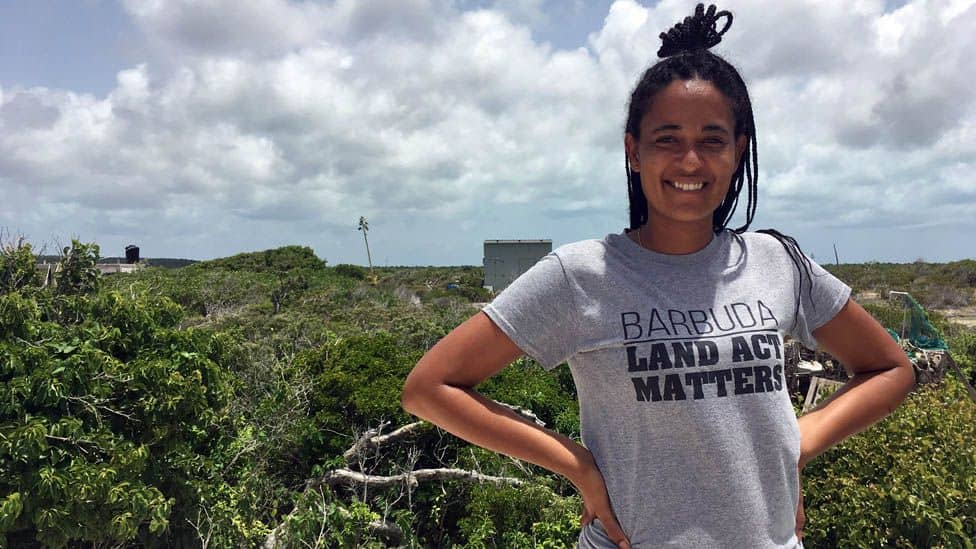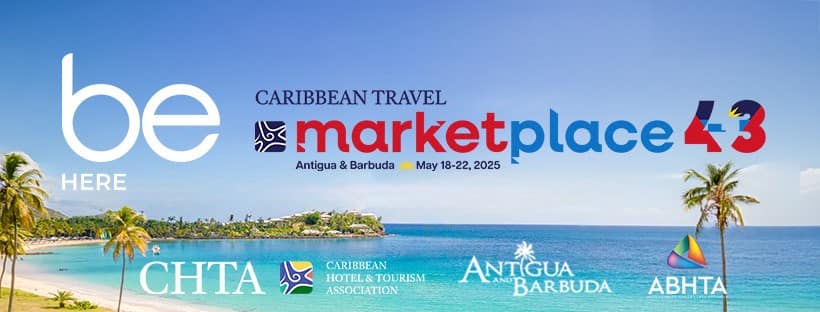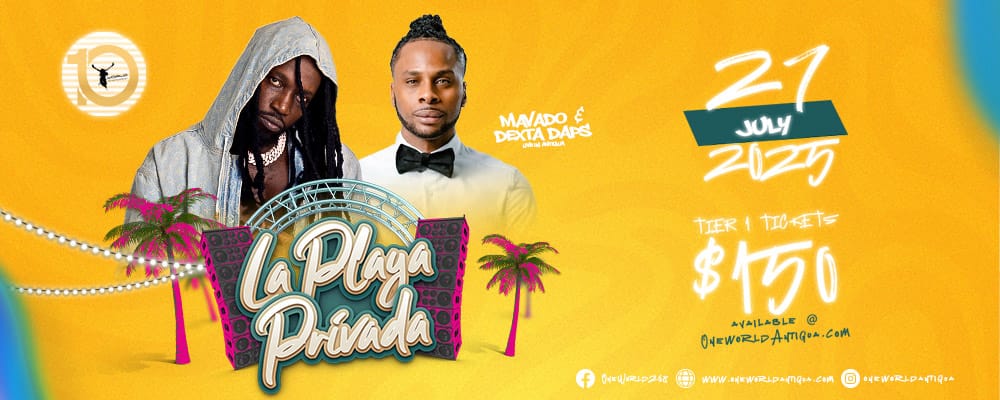
Hurricane Irma smashed its way across Barbuda in September 2017. It left a catastrophic trail of destruction. And when, in the aftermath, the island’s government resolved to introduce a system of private property, this kick-started old tensions.
Asha Frank hosts intrepid tourists in a wooden cabana built on the east of Barbuda. This is wilderness living – there is a well for fresh water, but no flushing toilet. The only sounds are from myriad birds that swoop and dive overhead and the crash of the Atlantic Ocean from beyond the sand dunes close by. You need a sturdy vehicle to get here because there is no paved road – just a roughly marked track on the stony terrain.
“Our visitors like to comb the beach. We have camp fires and grill nights. And a lot of the pictures on our website are of guests who catch fish, and then scale, cook and eat it on the spot.”
Fifty years ago, you could find many pristine spots in the Caribbean like this one. That was before tourism became the primary engine powering the economies of this region, making real estate highly desirable – and the foundation of many lucrative businesses.
Compared to its neighbours and especially its sister island of Antigua, Barbuda – just 23km long and 12km wide – has remained undeveloped. And that is largely because in modern times, private property has never existed here. Since the island’s slave population was emancipated in the 19th Century, land has been held in common. Barbudans do not own, but lease it to build their homes, to farm and for economic activity.
Asha Frank hosts intrepid tourists in a wooden cabana built on the east of Barbuda. This is wilderness living – there is a well for fresh water, but no flushing toilet. The only sounds are from myriad birds that swoop and dive overhead and the crash of the Atlantic Ocean from beyond the sand dunes close by. You need a sturdy vehicle to get here because there is no paved road – just a roughly marked track on the stony terrain.
“Our visitors like to comb the beach. We have camp fires and grill nights. And a lot of the pictures on our website are of guests who catch fish, and then scale, cook and eat it on the spot.”
Fifty years ago, you could find many pristine spots in the Caribbean like this one. That was before tourism became the primary engine powering the economies of this region, making real estate highly desirable – and the foundation of many lucrative businesses.
Compared to its neighbours and especially its sister island of Antigua, Barbuda – just 23km long and 12km wide – has remained undeveloped. And that is largely because in modern times, private property has never existed here. Since the island’s slave population was emancipated in the 19th Century, land has been held in common. Barbudans do not own, but lease it to build their homes, to farm and for economic activity.
“Land is part of our culture – this is about 300 years of history,” says Frank.
Because she didn’t have to buy her land, she was able to establish her eco-tourism business without investing thousands of dollars.
But moves to dismantle Barbuda’s system of tenure began just after Irma. Some 95% of Barbuda’s infrastructure was affected by the storm – much of it was completely obliterated. There are shiny new roofs in the village of Codrington, where the majority of Barbudans live. But there is also still plenty of evidence of the destructive powers of the hurricane – piles of broken masonry, tarpaulins tightly fastened over gaping holes, and palm trees ripped from their roots.
Less than a week after the storm Gaston Browne, prime minister of the government of the twin-island state of Antigua and Barbuda, declared his intention to privatise land on Barbuda – to enable islanders to borrow against their properties and help rebuild, he said. One of his suggestions was that all Barbudans be given deeds to the land they occupy for a nominal Eastern Caribbean $1.
Advertise with the mоѕt vіѕіtеd nеwѕ ѕіtе іn Antigua!
We offer fully customizable and flexible digital marketing packages.
Contact us at [email protected]

















Why own anything when I can always get a free lunch.
The fundamental basis of communism is complete common land ownership. There has yet to be an example of a communistic economic system leading to any economic significant prosperity whatsoever in the world. Therefore, I disagree with her macro economic views.
That said, I’m happy to see this woman engage in business and entrepreneurship. Being a business owner is a fun and exciting experience and she is clearly smart. He deserves an opportunity to succeed indeed.
In addition, I like her view on trying to create an approach that is about sustainable tourism and having genuine tourism experiences for guests.
She would be a good advisor to the government on long-term tourism strategy for our nation. We need younger smart people to be invited by the government to participate.
It is real sad that even young Barbudans like this lady still hold on to the myth the fallacy that they own the land in common. A person that owns land has a land certificate to show ownership. The land is and has always be Crown Land and since independence all Crown Land is now Government Land. And the Government has Barbuda as lease land and not in common but individually. Soon the Land Registry will have mapped out the entire Island and put all leases in the database. Because the free land grab that is taken place just by a handful of people down there is nothing more then theft. The leases were for private dwellings. Barbudans still believe Barbuda is for Barbudans and Antigua is for Antiiguans and Barbudans. That need to stop. Antigua and Barbuda is a UNITARY STATE.
“Barbudans still believe Barbuda is for Barbudans and Antigua is for Antiiguans and Barbudans.”
SAD BUT TRUE.
I am sure the government would not prevent her from leasing the lands she does her business on,to continue the type of Wilderness hosting she spoke of-but should not the residents own the lands they live on,for upward mobility,for their own good?? If it is that the population feels fine with their commune style living,then so be it.don’t expect however,that central Government should provide you with homes after any disaster..If they want to remain in the backward and Archaic state,then knock up some shacks and remain there.You cannot have it both ways.Flushing toilets ,Cable TV etc etc does not fit with plantation living..
Comments are closed.